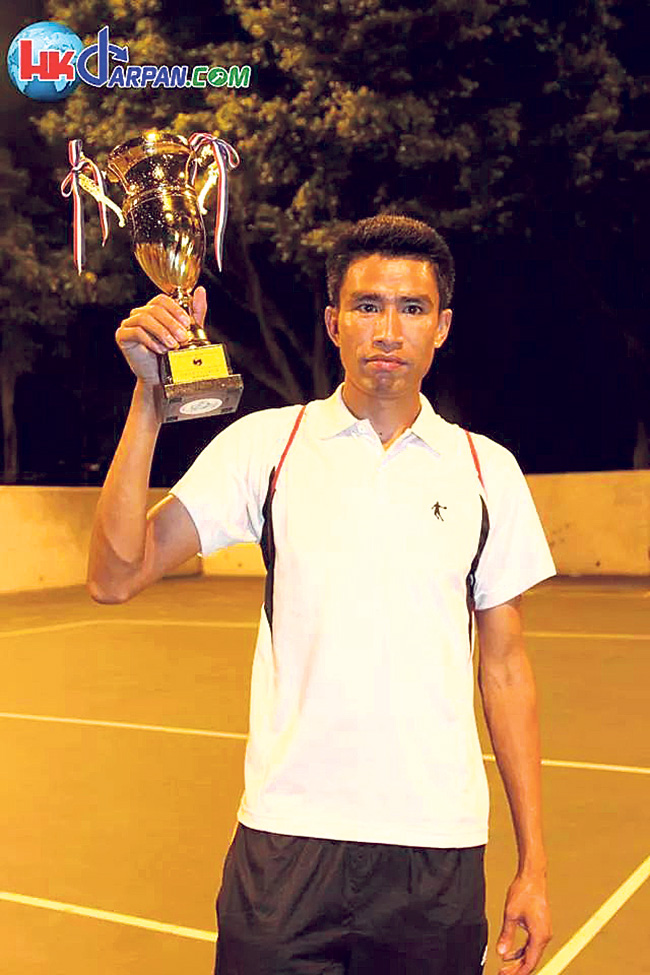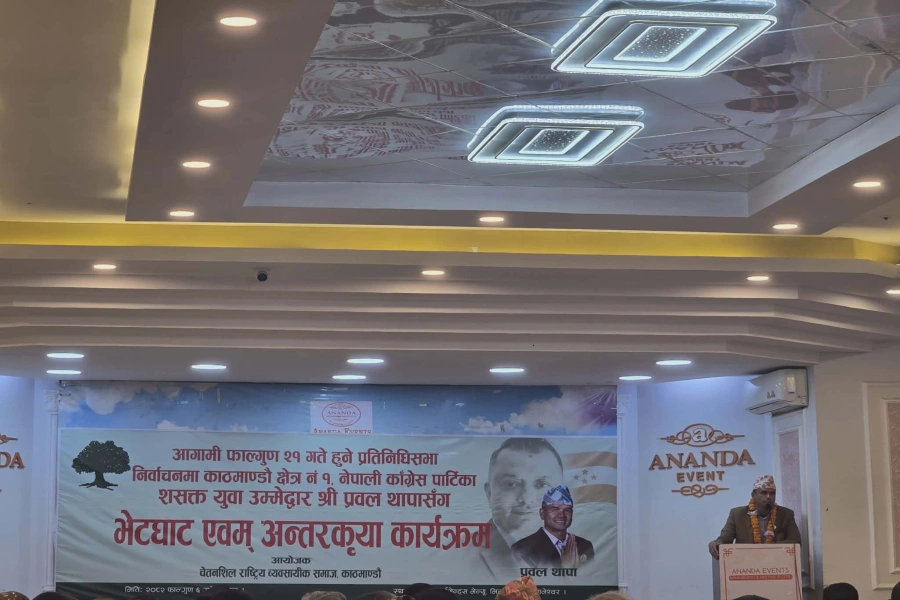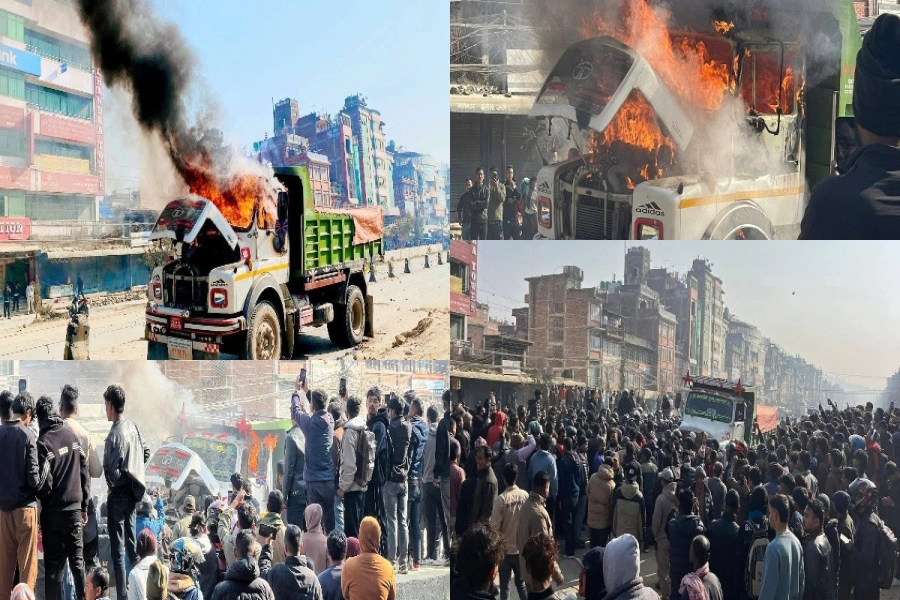Games and sports are essential to one’s health. It encourages not only physical wellbeing but also a sound mental health. Although many Nepali sportspersons have the caliber to perform in an international arena, the government has failed to prioritize sports.
As much as any other field, sports is also in dire need of investment for the field to flourish. My City’s Nasana Bajracharya talked to three national players about the situation of different sports in the country.
Gyanendra Malla
National Cricket Player
 Gyanendra Malla started playing cricket from the under-15 team before promoting to under-17, under-19 and in the national team. He has garnered fame and respect in the cricket fraternity. Taking about his humble beginnings, Gyanendra said one of his childhood friends had introduced him to cricket. Having a keen interest in playing cricket since his childhood, he secured a place in the national team only within a year of playing professionally.
Gyanendra Malla started playing cricket from the under-15 team before promoting to under-17, under-19 and in the national team. He has garnered fame and respect in the cricket fraternity. Taking about his humble beginnings, Gyanendra said one of his childhood friends had introduced him to cricket. Having a keen interest in playing cricket since his childhood, he secured a place in the national team only within a year of playing professionally.
During his journey, Gyanendra has observed that there are different levels of seriousness and utmost discipline gradually helps one up their game. “Your skills and knowledge about cricket are essential o be a professional player. Experiences count and you need to work hard every day to achieve professionalism,” he shared.
But it is a sad fact that in comparison to national teams, other local cricket teams don’t get the much needed exposure. Gyanendra said the problem lied in lack of training and awareness about professional cricket. “Even watching cricket is a new thing in our society. So, people don’t have the idea about how and why it is important.”
Talking about the national team, he said even they don’t get to frequently participate in matches and leagues. “Cricket is a culture in other countries, while we are only in the learning phase. Cricket can also be a career option and we need more time and investment to steer it into a professional direction.”
Pokhara aspiring as a water sports destination

“On top of that, we lack proper pitches and grounds that are essential for training. Also, cricket can be a reckless game sometimes so safety is always important to avoid mishaps. But we lack high quality gears too,” Gyanendra said.
He is currently training for the upcoming ICC World Cricket League Championship and stressed the importance of rigorous training in a cricketer’s life. He however added that the Nepali teams have a habit of training only prior to matches. “One needs to be physically fit and build his stamina along with mental sharpness to tackling every ball on the ground. This requires training throughout the year”
To change the habit, Gyanendra suggested introducing cricket in school curriculum and inter-school competitions. “Government needs to invest more. Whatever is being done is not enough to unleash the impact cricket can have over one’s health and life,” he added.
He added that even families should encourage and support their kids if they want to get involved in sports. “My family does not know much about cricket, but they supported me. With time, I have gained more support from fans as well.” He also runs the Kathmandu Cricket Training Center, where he trains school students and cricket enthusiasts. He said it was a medium for him to give something back to cricket.
Encouraging young cricket enthusiasts to pursue their dream, he said, “The results might not always be in your favor, but that shouldn’t discourage you. Hard work eventually pays off and you will be recognized if you have passion. Once you establish yourself, the initial struggle will not matter.”
Nabita Shrestha
National Table Tennis Player
 Table tennis, although is liked by many, has yet to gain professional popularity in Nepal. Six times champion and number one among women table-tennis players in the country, Nabita Shrestha has been playing table tennis since 2005. She started playing table tennis when she was in Grade VIII. As her love for the sport grew, she started training under a proper coach. After having received training from a skilled coach, she went on to win other junior level competition and eventually claimed the number one spot for herself when she won a national-level table tennis game in 2069 BS.
Table tennis, although is liked by many, has yet to gain professional popularity in Nepal. Six times champion and number one among women table-tennis players in the country, Nabita Shrestha has been playing table tennis since 2005. She started playing table tennis when she was in Grade VIII. As her love for the sport grew, she started training under a proper coach. After having received training from a skilled coach, she went on to win other junior level competition and eventually claimed the number one spot for herself when she won a national-level table tennis game in 2069 BS.
Once you reach the top position, there is always constant pressure and fear of falling back and Nabita also goes through the same. To combat insecurities of losing her position she focuses on her training and spends about two-and-a-half hour learning from her coach. Ever since she started formal training, Nabita believes she has been more observant and understands logic as well as dedication the game requires.
She has four other sisters, who are into fashion and beauty pageants, so Nabita always felt she was different. Nabita is currently training with veteran Rajendra Kapali, who is still an active table tennis player.
Training is very important in every player’s life. But, Nabina says there is not enough support from the National Association of Table Tennis or the government. “There is a difference between how table tennis is played abroad against how it is played in Nepal. We need the government’s support to upgrade table tennis in a professional level. Also we need more competitions; we cannot grow with a competition or two annually,” Nabita said.
She is preparing for upcoming national and international events and wants to continue playing. She did express her will to work as a coach in the future and establish her own table tennis training center. She is already on the process and said, “I hope my students to achieve what I couldn’t. I hope that table tennis would be as popular as football and cricket, and people eagerly wait for the next match.”
Em Rana Magar
National Volleyball Player
 Coming from a remote area of Kaski, Em played volleyball since his childhood with friends. Since 2001, he started and competed in many district level tournaments before coming to Kathmandu in 2003. He had come to the capital city for a tournament. His performance in the match managed to grab the attention of Armed Police Force Club and Nepal Police Club. He started playing for the NPC since 2062 BS and now has number of gold medal from various national games.
Coming from a remote area of Kaski, Em played volleyball since his childhood with friends. Since 2001, he started and competed in many district level tournaments before coming to Kathmandu in 2003. He had come to the capital city for a tournament. His performance in the match managed to grab the attention of Armed Police Force Club and Nepal Police Club. He started playing for the NPC since 2062 BS and now has number of gold medal from various national games.
Despite having the gold medals, Em believes continuous training is vital to give excellent performances. “Success is the point where you start training even more. With the pressure of getting gold medal next time too, you need to work on your flaws.”
Em religiously trains everyday from seven to 11 in the morning and focuses more on building his stamina and strategies. “Concentration is very important in the game; every point counts so sharp thinking and proper strategies should be practiced,” he shared.
Even with the success he has gained so far and given the fact that volleyball was declared Nepal’s national game, Em believes volleyball is yet to receive utmost exposure. “Volleyball needs the government’s support. It is the players that bring home medals, but the government has failed to acknowledge our efforts. We are in need of proper Infrastructure like covered halls and quality equipment,” he said.
Although a few international friendly matches are conducted in Nepal every now and then, they are not enough, he added. “Even the media should support and promote volleyball. For example we got a medal after 41 years and that’s a huge achievement. But we did not get any attention from the media or the government.”
One might think it hard to play and get into volleyball but Em has a different idea. “If you have the interest, potential and passion to play, you can most definitely achieve success with proper training. More than men, women have a greater chance to get into the national team since there are only a few women volleyball players,” Em shared.




































